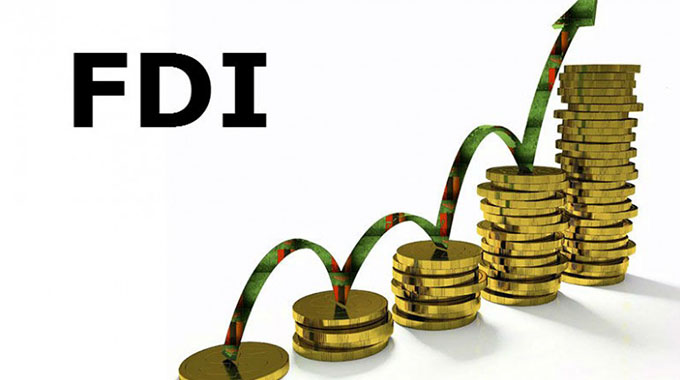EDITORIAL COMMENT: Billions in foreign direct investment imminent

Foreign direct investment (FDI) inflows into Zimbabwe more than doubled last year compared to the prior year, according to the authoritative United Nations Conference on Trade and Development (UNCTAD) World Investment Report.
The document says Zimbabwe attracted US$745 million worth of FDI in 2018, up from US$349 million the previous year.
The trajectory that is emerging is an encouraging one, but is not surprising in view of the efforts that the Government is making to make the country more attractive to investment from abroad and from local sources.
A wide range of reforms – both political and economic – are ongoing while others have been concluded as President Mnangagwa opens the country for business.
It is no secret that we are coming from a low base when investment dropped to very low figures because of a standoff that the Government had prior to November 2017 with key sources of FDI.
While Western sanctions remain, we are seeing an easing of tensions that will soon result in our country joining its neighbours in the billion dollar league in terms of FDI. South Africa attracted US$5, 3 billion in 2018, more than double the 2017 investment while Mozambique received FDI flows amounting to $2,7 billion in 2018, up from $2,3 billion in 2017.
“In Uganda and Zimbabwe, a small number of projects resulted in fast-growing FDI flows, but from an extremely low basis,” reads part of the report.
“Some new investments in the processing of natural resources may support the industrialisation process and a move up the value chain, such as the investment by Sinosteel (China) in Zimbabwe’s metal production, which has potential for major expansion in the medium term.”
The report also highlighted that Zimbabwe has the largest announced greenfield project among landlocked countries, in the form of the US$4,2 billion Karo Resources platinum project.
The Government is working hard to make the country an investment destination of choice. It is reforming the legislative framework; it is reforming its politics; it is changing the way it conducts business and is fighting corruption.
In terms of the legal framework, the Indigenisation and Economic Empowerment Act has been relaxed to enable foreign investors to put their money into any sector of their choice without the need for them to secure local partners to take 51 percent of the shareholding of the investments.
As such, an investor from anywhere in the world can take 100 percent shares in any local business including the platinum and diamond sectors that were previously set aside for domestic majority ownership.
The relaxation of this legal provision should help attract investment into the two areas and is a possible reason why we have the Karo platinum mining project now firmly on course.
Still on legal reforms, the Government is setting up the Zimbabwe Investment Development Agency (Zida), which is expected to be also a game changer that will ensure the attraction of FDI into the country.
The Zida Bill that was published in the Government Gazette recently is part of the reform agenda being pursued by the Government to ensure the country achieves upper middle-income status by 2030.
Approval of investment proposals would be expedited under Zida while the process would be simplified.
The Government is also engaging multilateral financial institutions to agree on the country’s debt repayment plan. An International Monetary Fund staff monitored programme is underway.
If, as expected, strategies being worked on to enable the country to repay its foreign debt are concluded and implemented, finance to reboot the economy would start flowing. Such a development would make the country more attractive as an investment destination.
Furthermore, President Mnangagwa is dialoguing with fellow politicians to create a consensus for greater peace and stability. A peaceful and stable economy would help attract more investment.
The world is acknowledging the reforms that are underway. The European Union, which has agreed to formal dialogue with Zimbabwe, has backed the ongoing reforms. The US has had the same message.
An influential London-based journal EU Today has said President Mnangagwa’s willpower has transformed the country through implementing various reforms, opening up the economy for business and international re-engagement is now bearing fruit.
“All these reforms take time, but they are necessary for the EU and US to lift long-standing sanctions,” says Martin Banks, a contributor to EU Today.
“The IMF appeared pleased, stating recently that ‘significant economic reforms were underway in Zimbabwe.’ — Slowly but surely, (President) Mnangagwa’s actions are bearing fruit. Leaders across Africa have called for the removal of sanctions, which would dramatically ease Zimbabwe’s economic burden.”
The growth in FDI inflows recorded last year is significant and is indeed welcome. However, the hard work that is being put in will surely enable the economy to attract billions worth of investment in the shortest possible time.










Comments